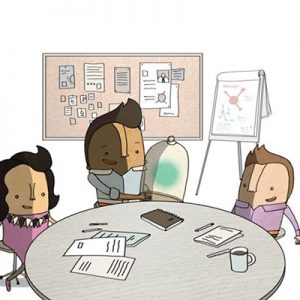During the summer of 1998 I visited Disneyland, built a zip-line, and got a new bike. It was the best summer of my life. And then I went to work for Nesta. I’ll leave it to my older self to sort out which summer was better, but working for an innovation charity was pretty darn great.

Nesta is an innovation charity with a mission to, as they put it, “help people and organisations bring great ideas to life.” I was stationed in the Futures team with a bunch of ‘futurologists’ working on projects related to education policy, the ethical implications of big data and machine-learning, ‘playable cities’, and innovation in the media. (A word to the wise: never call a ‘futurologist’ a futurologist to his or her face. They hate it.) My own research at Nesta was meant to look at the conversations that have surrounded automation over the past century and deliver a talk on my findings at Nesta’s semi-annual festival, FutureFest. Futurologists mingling with historians? These are strange times, indeed.

My main question heading into this placement was how well historical research would be able to inform Nesta’s more future-focused research. Even if I was able to identify a historical trend I would not necessarily be able to say whether that trend would continue in the future. However, in my first week at Nesta I came to view my role not as attempting to predict what will happen over the next decade, but as challenging my audience at FutureFest to question their own assumptions about what they believe will happen over those years. As my first blog for Nesta showed, many generations have convinced themselves that they are unique – that they are experiencing unprecedented and rapid changes relative to the changes experienced by the generations that came before. My work has focused on drawing people’s attention to this recurrent belief and challenging them to think critically about why they believe they are the exception to this rule.
— — —
It was a nice change of pace to work as part of a team again and to work toward a common goal. Writing a humanities thesis can be quite lonely, isolated work. Don’t get me wrong, I enjoy it (who wouldn’t enjoy sitting at home in your pants – the British kind – writing for 10-12 hours a day?) but there was also something really great about having colleagues to bounce ideas off of, plan projects with, and receive guidance from. Nesta is definitely the kind/type of organisation I could see myself working for somewhere down the road. I get the sense that Nesta researchers are able to delve deeply into a research area for six months to a year, then delve into another related but different area after that. A research career that moved from interesting project to interesting project definitely appeals to me.
Plus, there were two burrito places and three artisan coffee shops near the Nesta office. For a Californian like me, that’s damned near Nirvana.